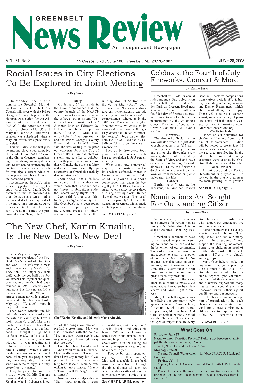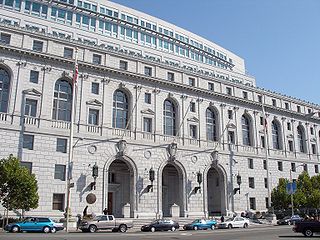
Greenbelt is a city in Prince George's County, Maryland, United States, and a suburb of Washington, D.C. At the 2020 census, the population was 24,921.
Hyperbole is the use of exaggeration as a rhetorical device or figure of speech. In rhetoric, it is also sometimes known as auxesis. In poetry and oratory, it emphasizes, evokes strong feelings, and creates strong impressions. As a figure of speech, it is usually not meant to be taken literally.
Gertz v. Robert Welch, Inc., 418 U.S. 323 (1974), was a landmark decision of the US Supreme Court establishing the standard of First Amendment protection against defamation claims brought by private individuals. The Court held that, so long as they do not impose liability without fault, states are free to establish their own standards of liability for defamatory statements made about private individuals. However, the Court also ruled that if the state standard is lower than actual malice, the standard applying to public figures, then only actual damages may be awarded.
Prior restraint is censorship imposed, usually by a government or institution, on expression, that prohibits particular instances of expression. It is in contrast to censorship that establishes general subject matter restrictions and reviews a particular instance of expression only after the expression has taken place.
Freedom of the press in the United States is legally protected by the First Amendment to the United States Constitution.
Quill Corp. v. North Dakota, 504 U.S. 298 (1992), was a United States Supreme Court ruling, since overturned, concerning use tax. The decision effectively prevented states from collecting any sales tax from retail purchases made over the Internet or other e-Commerce route unless the seller had a physical presence in the state. The ruling was based on the Dormant Commerce Clause, preventing states from interfering with interstate commerce unless authorized by the United States Congress. The case resulted from an attempt by North Dakota seeking to collect sales tax on licensed computer software offered by the Quill Corporation, an office supply retailer with no North Dakota presence, that allowed users to place orders directly with Quill.
Neutral reportage is a common law defense against libel and defamation lawsuits usually involving the media republishing unproven accusations about public figures. It is a limited exception to the common law rule that one who repeats a defamatory statement is just as guilty as the first person who published it.

In United States law, a federal enclave is a parcel of federal property within a state that is under the "Special Maritime and Territorial Jurisdiction of the United States". These enclaves are used for the many different functions of the US federal government, and include post offices, arsenals, dams, road, etc., and usually are owned, secured and administered by the US federal government itself. The US in many cases has received similar jurisdictional authority over privately owned properties which it leases, or privately owned and occupied properties which are located within the exterior boundaries of a large area as to which a state has ceded jurisdiction to the US.
The origins of the United States' defamation laws pre-date the American Revolution; one influential case in 1734 involved John Peter Zenger and established precedent that "The Truth" is an absolute defense against charges of libel. Though the First Amendment of the U.S. Constitution was designed to protect freedom of the press, for most of the history of the United States, the U.S. Supreme Court failed to use it to rule on libel cases. This left libel laws, based upon the traditional "Common Law" of defamation inherited from the English legal system, mixed across the states. The 1964 case New York Times Co. v. Sullivan, however, radically changed the nature of libel law in the United States by establishing that public officials could win a suit for libel only when they could prove the media outlet in question knew either that the information was wholly and patently false or that it was published "with reckless disregard of whether it was false or not". Later Supreme Court cases barred strict liability for libel and forbade libel claims for statements that are so ridiculous as to be obviously facetious. Recent cases have added precedent on defamation law and the Internet.

The Greenbelt News Review is a weekly newspaper that was established in 1937 as a volunteer cooperative shortly after settlement of Greenbelt, Maryland, and was originally named the Greenbelt Cooperator until its name was changed in 1954. It has been published without interruption every week since its founding, and is distributed free by a network of carriers to all city residents.
Home Building & Loan Association v. Blaisdell, 290 U.S. 398 (1934), also called the Minnesota Mortgage Moratorium Case, was a decision of the United States Supreme Court holding that Minnesota's suspension of creditors' remedies was not in violation of the Contract Clause of the United States Constitution. Blaisdell was decided during the depth of the Great Depression and has been criticized by modern conservative and libertarian commentators.
International Association of Machinists v. Street, 367 U.S. 740 (1961), was a United States labor law decision by the United States Supreme Court on labor union freedom to make collective agreements with employers to enroll workers in union membership, or collect fees for the service of collective bargaining.
Dorothy Sucher was an American author and psychotherapist who worked as a reporter at the Greenbelt News Review, where an article that she wrote that quoted critics of a developers calling his plans "blackmail" initially resulted in a $17,500 judgement against the paper. The U.S. Supreme Court would later overturn the lower court verdict, ruling in Greenbelt Cooperative Publishing Assn. v. Bresler that the use of "rhetorical hyperbole" in such cases is covered by the First Amendment, a major victory that supported Freedom of the press in the United States.
Brentwood Academy v. Tennessee Secondary School Athletic Association, 531 U.S. 288 (2001), is a United States Supreme Court case concerning whether the actions of an interscholastic sport-association that regulated sports among Tennessee schools could be regarded as a state actor for First Amendment and Due Process purposes. The Court held that the sport-association can be sued as a state actor because its actions and history have been "entangled" with state action. While the Supreme Court would reconsider this same case in the future, this specific decision became important in articulating a new principle of what entities are bound by the First Amendment.
In Miller Brothers Co. v. Maryland, 347 U.S. 340 (1954), the Supreme Court ruled 5-4 that a mail order reseller was not required to collect a use tax unless it had sufficient contact with the state.
Harte-Hanks Communications Inc. v. Connaughton, 491 U.S. 657 (1989), was a case in which the Supreme Court of the United States supplied an additional journalistic behavior that constitutes actual malice as first discussed in New York Times Co. v. Sullivan (1964). In the case, the Court held that departure from responsible reporting and unreasonable reporting conduct alone were not sufficient to award a public figure damages in a libel case. However, the Court also ruled that if reporters wrote with reckless disregard for the truth, which included ignoring obvious sources for their report, plaintiffs could be awarded compensatory damages on the grounds of actual malice.
Direct Marketing Association v. Brohl, 575 U.S. 1 (2015), was a United States Supreme Court case in which the Court held that a lawsuit by the Direct Marketing Association trade group about a Colorado law regarding reporting the state's tax requirements to customers and to the Colorado Department of Revenue is not barred by the Tax Injunction Act. While the case was reheard and found in favor of Colorado, the concurrence of Justice Anthony Kennedy provided a means for states to bring a challenge the ruling of Quill Corp. v. North Dakota, which has prevented states from collecting taxes from out-of-state vendors.

Yorty v. Chandler, 13 Cal.App.3d 467 (1970), was a decision by the California Court of Appeals, 2nd District involving how strictly an editorial cartoon needed to be interpreted in lawsuits for libel. It is a significant decision in the case law of applying the First Amendment to editorial cartoons and has been cited as a persuasive authority by other U.S. courts.
United States v. Miller, 425 U.S. 435 (1976), was a United States Supreme Court that held that bank records are not subject to protection under the Fourth Amendment to the United States Constitution. The case, along with Smith v. Maryland, established the principle of the third-party doctrine in relation to privacy rights.
American Legion v. American Humanist Association, 588 U.S. 19 (2019), was a United States Supreme Court case dealing with the separation of church and state related to maintaining the Peace Cross, a World War I memorial shaped after a Latin cross, on government-owned land, though initially built in 1925 with private funds on private lands. The case was a consolidation of two petitions to the court, that of The American Legion who built the cross, and of the Maryland-National Capital Park and Planning Commission who own the land and maintain the memorial. Both petitions challenged the Fourth Circuit's ruling that, regardless of the secular purpose the cross was built for in honoring the deceased soldiers, the cross emboldened a religious symbol, and had ordered it altered or razed. The Supreme Court reversed the Fourth Circuit's ruling in a 7–2 decision, determining that since the Cross had stood for decades without controversy, it did not violate the Establishment Clause and could remain standing.




